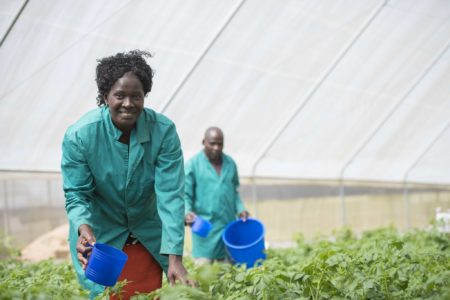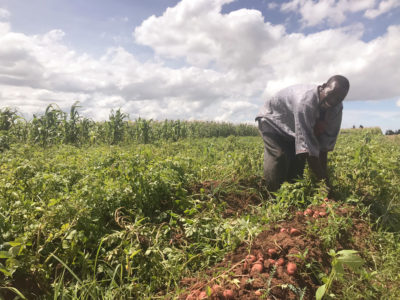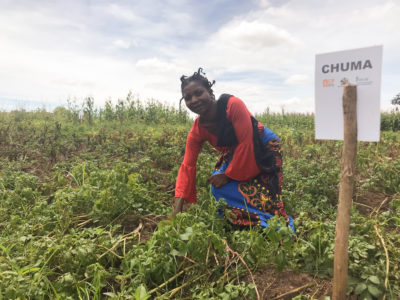
Near the end of the last potato growing season in Malawi’s district of Dedza, Leonard Mideyo dug up a mound of soil with his hands on his roadside potato plot. This location is strategic, he explained, to show the performance of the different varieties on the plot. Pulling up wilted potato stems from the soil, he spotted a few fresh tubers. A disappointed look on his face, he put the stem and four tiny tubers attached to it back on the ground. These are of the popular ‘Violet’ type, a local variety with purple skin. He quickly moved on to the next rows where he grows another five varieties: Chuma, Rosita, Thandizo, Mwai and Zikomo. A smile returned to his face each time as he pulled more tubers, finding more per plant in the subsequent rows.
This was a difficult season.
The devastating potato disease—late blight—hit most farmers hard, wiping entire crops off the fields of Dedza. Many farmers had planted the local variety Violet which is highly susceptible to late blight disease, with disastrous effects. Plans to change this are underway.
The International Potato Center (CIP) and partners—under the Root and Tuber Crops for Agricultural Transformation (RTC-Action) in Malawi project—are working to ensure farmers have access to productive, climate-resilient and nutritious varieties of potato, sweetpotato and cassava. RTC-Action is a five-year project (April 2016 to March 2021), funded by Irish Aid.

For potato, new varieties suitable for Malawi bred by CIP researchers working closely with those at the country’s Bvumbwe Agricultural Research Station are now available to farmers. The new varieties carry traits such as early maturity (of up to 90 days) as well as tolerant to pests and destructive diseases such as potato late blight. Also, they are high yielding compared to local varieties.
The dissemination approach entails working with model farmers, such as Leonard and others, to establish demonstration farms to showcase performance of new varieties over local varieties, to spur interest amongst potato farmers leading to adoption in subsequent growing seasons.
“Today on my half-acre plot, I am growing six varieties of potato,” Leonard explained. “Together with my community, we want to find out which variety is best to grow under changing climatic conditions in Malawi.”
He has been growing maize and potato since 2015 with a focus on local varieties such as Violet.
“In my assessment Chuma and Rosita are not only high yielding but also tolerant to late blight. Last season I made 2 million kwacha (USD 2,700) from sale of seed and ware potato within a span of 10 months”, he said.
A few kilometers from Leonard’s plot, Linda Israel has set up another field with the help of the RTC-Action project team. She has already hosted up to 115 farmers on her farm, mostly her neighbors who helped evaluate the performance of five new varieties and the local Violet as a check.
“Farmers here appreciate Chuma”, said Linda. “It is more high yielding compared to all the other six varieties,” she added.

As access to clean planting material is one of biggest challenges to productivity that farmers face, a state-of-the-art potato seed multiplication unit is maintained at Bvumbwe station. This combines technologies such as aeroponics and sandponics to guard against pests and diseases.
“In aeroponics, plants are suspended in the air and grown soilless in closed containers where the plants are free from pathogens,” explained Tiwonge Chadzala, a CIP Research Technician at the Bvumbwe Research Station in Thyolo. Further, more tubers (up to 45/plant) are produced in aeroponics. Clean seed of the local varieties are also made available to ensure farmers who still prefer to grow them can improve their productivity.
A few trained seed multipliers, such as the Khanganya irrigation group in Dedza, can then access clean seed from the research station for further multiplication and distribution to farmers. For instance, farmer Geoffrey Christiano also in Dedza bought 80kg of Chuma seed potato from the Khanganya group and harvested 1550kg from his 0.2-acre farm.
All in all, as farmers continue to grapple with erratic weather patterns, having access to high yielding and early maturing varieties of root and tuber crops should increase productivity amongst vulnerable households. This in turn will lead to better food and nutrition security as well as incomes of small-scale farming households of Malawi.
Read more: Root and tuber crops for agricultural transformation in Malawi
Watch Transforming livelihoods of potato and sweetpotato farmers in Malawi
Blog written by Vivian Atakos with contributions from the RTC-Action team in Malawi.
